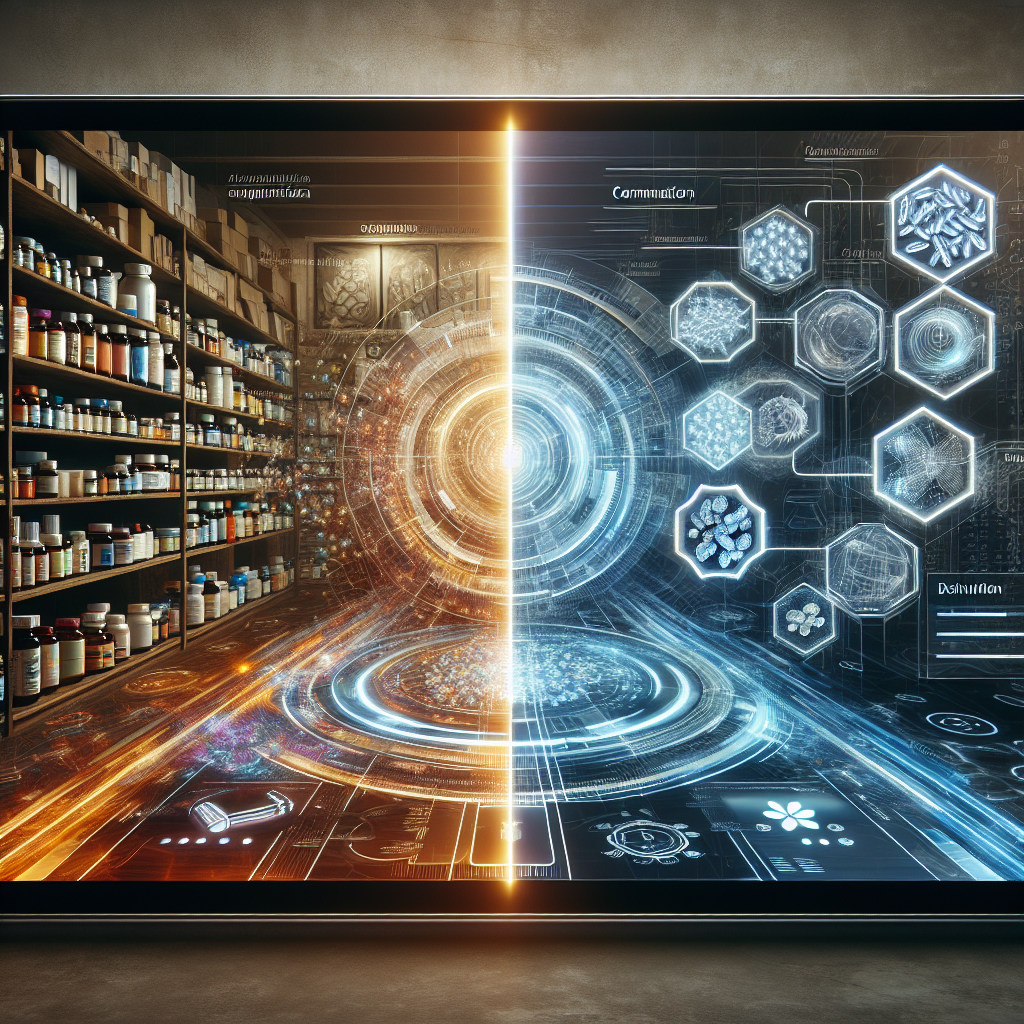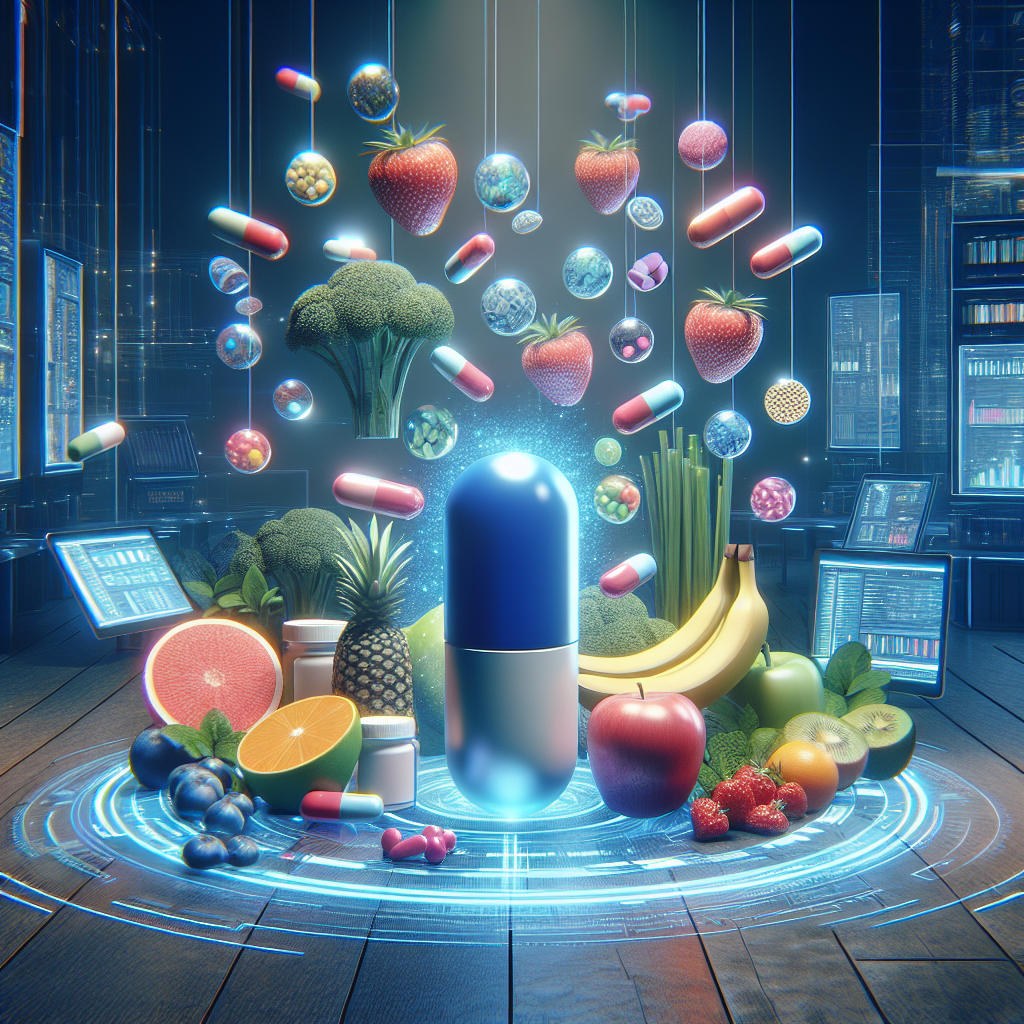The Intersection of Technology and Wellness: Vitamins

Discover the powerful intersection of technology and wellness with our range of vitamins. Enhance your health and wellbeing today. Visit My Vibrant Vitality now.
Exploring the Role of Technology in Enhancing Vitamin Intake
The intersection of technology and wellness is a fascinating and rapidly evolving field, with new developments constantly emerging to enhance our health and wellbeing. One area where this intersection is particularly evident is in the realm of vitamins. Technology is playing an increasingly significant role in enhancing vitamin intake, offering innovative solutions to help us maintain optimal health.
Traditionally, vitamins have been consumed in the form of pills, capsules, or liquids. However, these methods often come with challenges such as difficulty swallowing, forgetfulness, or simply the inconvenience of having to take them at specific times. Technology has stepped in to address these issues, offering new and improved ways to ensure we get the vitamins we need.
One of the most significant technological advancements in this area is the development of smart pill dispensers. These devices not only store and dispense vitamins at pre-set times, but they also come equipped with reminders and alerts to ensure that users never miss a dose. Some even have the capability to sync with smartphones or other devices, providing real-time tracking and reminders. This not only makes it easier for individuals to stick to their vitamin regimen, but it also allows healthcare providers to monitor their patients’ adherence to their vitamin intake.
In addition to smart pill dispensers, technology has also revolutionized the way vitamins are delivered into our bodies. For instance, vitamin-infused patches have emerged as a popular alternative to traditional methods. These patches, which are applied directly to the skin, slowly release vitamins into the bloodstream over a period of time. This method not only eliminates the need to swallow pills or remember to take them at certain times, but it also ensures a steady and consistent release of vitamins, which can be more effective in maintaining optimal levels in the body.
Moreover, technology has also made it possible to personalize vitamin intake based on individual needs. Companies are now offering DNA testing services that analyze an individual’s genetic makeup to determine their specific vitamin needs. This personalized approach ensures that individuals are getting the right types and amounts of vitamins for their unique bodies, potentially improving their overall health and wellbeing.
Furthermore, the rise of mobile apps and online platforms has made it easier than ever to access information about vitamins. These resources provide valuable insights into the benefits of different vitamins, recommended daily intake, and potential side effects. They also offer tips and advice on how to incorporate vitamins into a balanced diet. This wealth of information at our fingertips empowers us to make informed decisions about our vitamin intake.
In conclusion, technology is playing a pivotal role in enhancing vitamin intake. From smart pill dispensers and vitamin-infused patches to personalized DNA testing and online resources, technology is making it easier, more convenient, and more effective to maintain optimal vitamin levels. As technology continues to advance, we can expect to see even more innovative solutions in this area, further enhancing our health and wellbeing. The intersection of technology and wellness is indeed a promising frontier, offering exciting possibilities for the future of health and wellness.
The Impact of Digital Advancements on Vitamin and Nutrient Tracking

The intersection of technology and wellness is a rapidly evolving landscape, with digital advancements playing a pivotal role in the way we understand and manage our health. One area where this is particularly evident is in the tracking of vitamins and nutrients. The advent of digital tools and platforms has revolutionized our ability to monitor our nutritional intake, providing us with a wealth of data that can be used to optimize our health and wellbeing.
Traditionally, tracking our vitamin and nutrient intake was a laborious process, often involving manual record-keeping and a reliance on memory. However, the digital age has ushered in a new era of convenience and accuracy. Today, there are numerous apps and devices that can automatically track what we eat and drink, breaking down our consumption into individual vitamins and nutrients. This allows us to see, at a glance, whether we are meeting our daily nutritional requirements, and where we might need to make adjustments.
Moreover, these digital tools can provide personalized recommendations based on our unique nutritional needs. By inputting data such as age, gender, weight, and activity level, we can receive tailored advice on what vitamins and nutrients we should be prioritizing. This is a significant departure from the one-size-fits-all approach of the past, and a testament to the power of technology to deliver personalized health solutions.
The impact of these digital advancements extends beyond the individual. On a broader scale, they are contributing to a shift in our collective understanding of health and wellness. As we become more aware of the importance of vitamins and nutrients, and the role they play in our overall health, we are beginning to see a shift towards a more holistic approach to healthcare. This is reflected in the growing popularity of preventative health measures, such as regular exercise and a balanced diet, as well as an increased interest in natural remedies and supplements.
However, while the benefits of these digital advancements are clear, they are not without their challenges. One of the main issues is the accuracy of the data. While these tools can provide a wealth of information, they are only as good as the data they are based on. This means that users need to be diligent in recording their food and drink intake, and honest about their lifestyle habits. Additionally, there is the issue of data privacy. With so much personal information being collected and stored, there are legitimate concerns about how this data is being used and who has access to it.
Despite these challenges, the intersection of technology and wellness is an exciting frontier, with the potential to transform our approach to health and wellbeing. As digital advancements continue to evolve, we can expect to see even more innovative solutions for tracking vitamins and nutrients, and a greater emphasis on personalized health solutions. This is not only beneficial for individuals looking to optimize their health, but also for healthcare providers, who can use this data to deliver more targeted and effective treatments.
In conclusion, the impact of digital advancements on vitamin and nutrient tracking is profound. By providing us with a wealth of data and personalized recommendations, these tools are empowering us to take control of our health and wellbeing. While there are challenges to overcome, the potential benefits are immense, heralding a new era of personalized health and wellness.
Innovative Tech Solutions for Personalized Vitamin Recommendations
The intersection of technology and wellness is a rapidly evolving landscape, with innovative tech solutions continually emerging to enhance our health and wellbeing. One area where this intersection is particularly evident is in the realm of vitamins. The advent of personalized vitamin recommendations, powered by cutting-edge technology, is revolutionizing the way we approach our nutritional health.
Traditionally, vitamin intake has been a one-size-fits-all affair, with broad recommendations based on age, gender, and sometimes lifestyle factors. However, this approach fails to account for the unique genetic makeup and individual health needs of each person. This is where technology steps in, offering a more personalized, precise, and effective approach to vitamin supplementation.
The first step in this process is data collection. Advanced biometric devices and mobile applications are now capable of tracking a wide range of health metrics, from heart rate and sleep patterns to blood glucose levels and nutrient deficiencies. This data can then be analyzed using sophisticated algorithms to identify individual health needs and potential nutritional gaps.
Next, genetic testing technology comes into play. By analyzing a person’s DNA, these tests can reveal specific genetic variations that may affect how the body absorbs and utilizes certain vitamins. For instance, a person with a certain genetic variation may require a higher intake of vitamin B12, or may not absorb vitamin D efficiently. This information can be invaluable in tailoring a personalized vitamin regimen.
Once the data has been collected and analyzed, the final step is the creation of personalized vitamin recommendations. This is where artificial intelligence (AI) and machine learning technologies shine. These technologies can sift through vast amounts of data, identify patterns, and make highly accurate predictions. In the context of vitamins, AI can take into account a person’s health data, genetic information, lifestyle factors, and even personal preferences to recommend a personalized vitamin regimen.
Moreover, the use of technology in personalized vitamin recommendations is not a one-time process. As our health status and lifestyle change, so too should our vitamin intake. Continuous monitoring and data analysis allow for dynamic adjustments to the vitamin regimen, ensuring it remains optimal for the individual’s current needs.
The benefits of this tech-driven approach to vitamins are manifold. Firstly, it can help individuals to better meet their nutritional needs, potentially improving their overall health and wellbeing. Secondly, it can prevent unnecessary or excessive vitamin intake, which can sometimes be harmful. Lastly, it can empower individuals to take a more proactive and informed approach to their health.
In conclusion, the intersection of technology and wellness in the realm of vitamins is a promising development. Innovative tech solutions, such as biometric devices, genetic testing, AI, and machine learning, are enabling a more personalized, precise, and dynamic approach to vitamin supplementation. As technology continues to advance, we can expect to see even more exciting innovations in this area, further enhancing our ability to optimize our health and wellbeing.